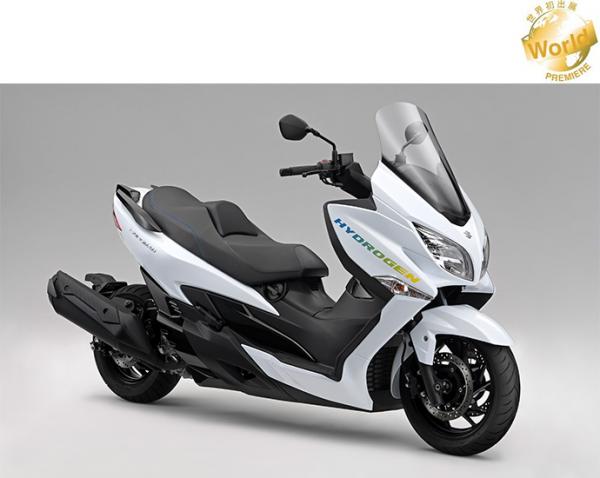
Two new versions of the Suzuki Burgman are set for display at the upcoming 2023 Japan Mobility Show (formerly the Tokyo Motor Show), as both hydrogen and electric power are explored in Hamamatsu.
Suzuki’s theme for its booth at the Japan Mobility Show is “Answers for Excitement throughout the World,” which will be presented along with the message: “Present to our customers with diverse initiatives toward a carbon neutral future in mobility and services unique to Suzuki.”
The headline exhibitions on the Suzuki booth from a motorcycle perspective are undoubtedly the two Burgmans. One features an electric powertrain, while the other is hydrogen-fuelled.
Suzuki Burgman hydrogen concept
The Suzuki Burgman hydrogen concept that the Hamamatsu marque will showcase in Tokyo at the beginning of next month is described as having a “hydrogen engine”, meaning this is a bike burning hydrogen, rather than using a kind of reverse electrolysis to generate electricity like a fuel cell.
Its fuel source is given away by two things. The first is its extremely long wheelbase - which almost makes it look like a dragster scooter and has presumably been incorporated into the design to avoid the kind of ‘canister panniers’ Kawasaki has proposed for its high-performance hydrogen bike - and the second is the word “hydrogen” splashed on the bodywork.
The bike is also functional - the booth at which it will be displayed will also show a video of the bike being test-ridden, which will also introduce “Suzuki’s initiatives for hydrogen engines,” a Suzuki press release reads.
In general, the hydrogen bike - which will feature a hydrogen tank set at a pressure of 70MPa - looks to be based more closely on the Suzuki Burgman 400 than the smaller Suzuki Burgman 125EX Street, with its dual front discs, large two-up seat, and big front bodywork and screen.
Hydrogen-fueled engine developed by Yamaha.
Fellow Japanese automotive firm Toyota has also been experimenting with hydrogen combustion, and has even developed projects and experiments with motorcycle manufacturers such as Yamaha and Kawasaki. But there are hurdles to hydrogen combustion becoming a production reality for either bikes or cars. One of the biggest is consumption, because the fuel burns eight times as quickly as petrol, and another is containment (hence the Burgman’s wheelbase and Kawasaki’s canisters) because hydrogen’s density is so low, so it’s unclear what the future holds for this idea.
Suzuki e-Burgman
The Suzuki e-Burgman is, as the name implies, an electric version of the standard Burgman. Suzuki defines it as a 125cc equivalent, which is evidenced by it being much more compact than the hydrogen bike.
It was used as the beginning of a demonstration project in April this year and utilises the Gachaco battery-sharing service that was set up by Suzuki and its fellow ‘Japanese big four’ members (Yamaha, Honda, and Kawasaki) in 2019.
The idea of the project the bike has been designed for is to gather data to help improve Suzuki’s development of future electric bikes.
Other exhibitions
Suzuki’s other exhibitions include a questionable-looking electric SUV, a boxy electric minivan, an electric commercial van, and two other boxy cars under the name ‘Spacia’. There is also a weird robot-dog-looking thing which Suzuki says is a “Proposal for next-generation mobility utilising wheels and four legs for those who face barriers in transportation such as steps.”
Slightly more interesting than those are e-PO (above) 50cc-equivalent electric folding pedal-assist moped developed in conjunction with Panasonic, and the e-Choinori (below), which is an electric 50cc-equivalent scooter which uses the battery and powertrain units of Panasonic Cycle Technology e-bikes and is based on the original Choinori scooter that was first introduced in 2003.
As well as Suzuki, both Honda and Yamaha have announced their Japan Mobility Show exhibitions, with Yamaha taking a bike that can sense its owner approaching it, and Honda showcasing some electric scooters.

